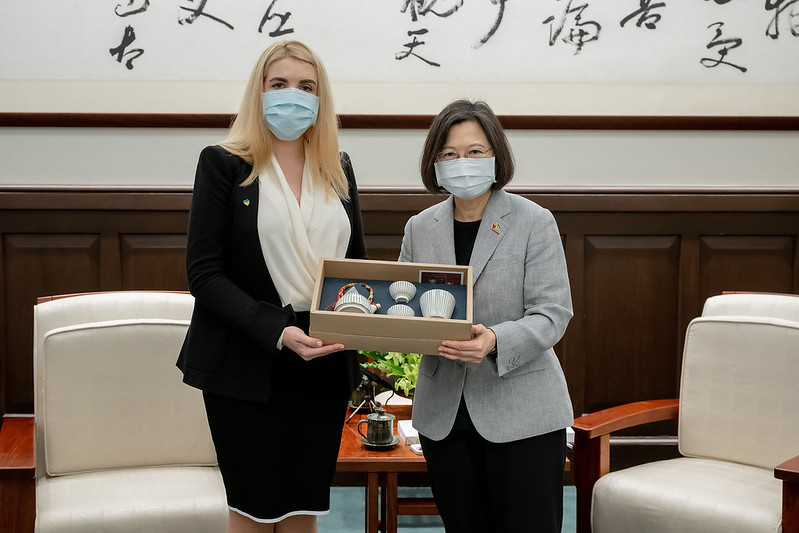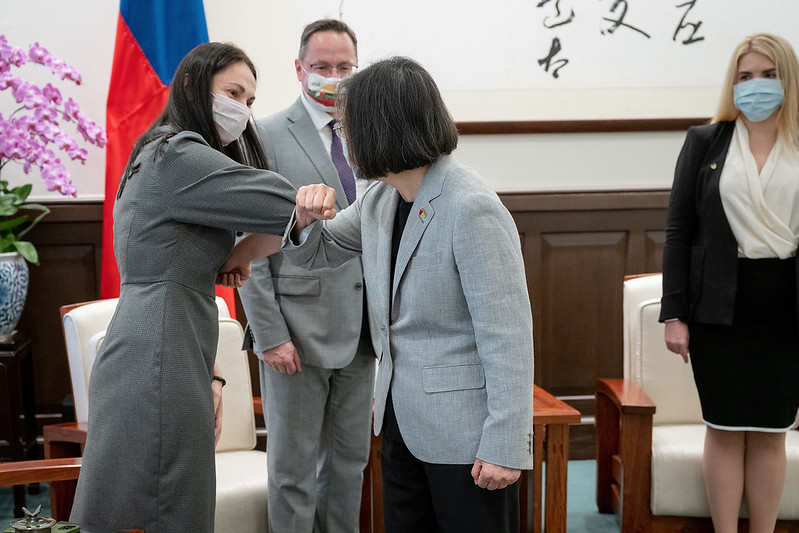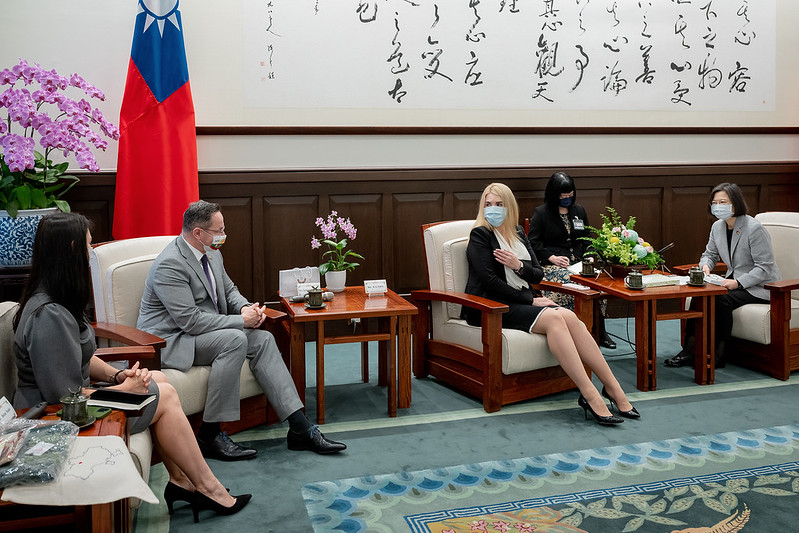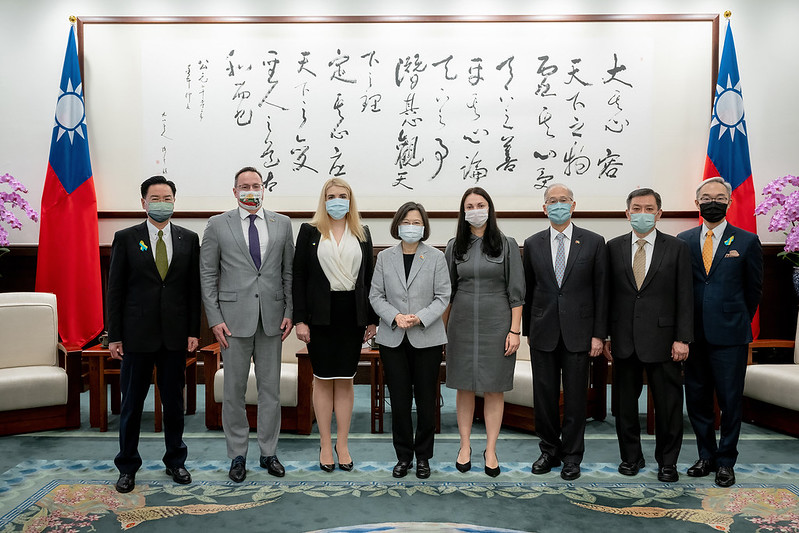News & activities
 News releases
News releases
On the morning of October 27, President Tsai Ing-wen met with members of the Taiwan Friendship Caucus of the Ukrainian Verkhovna Rada (parliament) and the Committee on European Affairs of the Lithuanian Seimas (parliament). In remarks, President Tsai emphasized that Taiwan, Ukraine, and Lithuania all stand on the frontlines of the defense against authoritarian expansion, which is why the people of Taiwan are especially empathetic to the situation in Ukraine. The president further stated that Taiwan will be a rock-solid partner to Ukraine. She also thanked Lithuania for working with Taiwan to establish mutual representative offices in each other's countries despite facing enormous pressure from China, showing Lithuania's determination to defend the friendship between our countries. President Tsai expressed her belief that democratic countries such as Taiwan, Ukraine, and Lithuania will undoubtedly deepen their democratic alliance and demonstrate the strength of our solidarity in the fight against authoritarianism.
A translation of President Tsai's remarks follows:
I would like to welcome you all. You have traveled a long way to be here today, demonstrating the power of solidarity among democracies through your actions. We greatly admire the formidable spirit and firm friendship of member of the Verkhovna Rada Taiwan Friendship Caucus Kira Rudik and former member of the Verkhovna Rada Hanna Hopko, who took an arduous trip of almost 40 hours by land and air to come to Taiwan, despite the difficulties and risks posed by the war.
Russia's invasion of Ukraine, which started in February this year, has profoundly affected the global democratic order and the protection of freedom and human rights. The war has made global democratic partners realize that we must stand united against the expansion of authoritarianism.
Taiwan, Ukraine, and Lithuania all stand on the frontlines of the defense against authoritarian expansion. That is why the people of Taiwan are especially empathetic to the situation in Ukraine. Taiwan immediately condemned the Russian invasion in the strongest terms and joined the international community in imposing economic sanctions on Russia. Both our government and civil society promptly launched donation drives to help displaced Ukrainians, efforts that garnered an enthusiastic response from our people.
Meanwhile, despite enormous pressure from China, Lithuania has established mutual representative offices with Taiwan, showing its determination to defend the friendship between our countries. These actions fully demonstrate that Taiwan, Lithuania, and Ukraine stand resolute in our defense of the values of democracy and freedom, support one another, and are united in our fight against authoritarian expansion.
In the face of pressure from China, Chair of the Foreign Policy Committee of the Ukrainian Verkhovna Rada Oleksandr Merezhko established the Taiwan Friendship Caucus, which he was encouraged to do by Deputy Chair of the Lithuanian Seimas Committee on European Affairs Žygimantas Pavilionis. The caucus has won support from 15 parliamentarians of different political parties.
In response, Taiwan's Legislative Yuan this month established the Taiwan-Ukraine Parliament Members Friendship Association. Just two days ago, you visited the Legislative Yuan. In these difficult times, bilateral exchanges like this are especially significant. I trust that in the future, Taiwan and Ukraine will continue to deepen our democratic ties and engage in further cooperation and exchanges.
We have also made preparations and allocated a budget to work with like-minded Central and Eastern European countries to jointly assist in the rebuilding of Ukraine after the war. I hope that the people of Ukraine will soon be able to restore their homeland.
At yesterday's reception, Ms. Rudik, together with Ukrainian expatriates and students in Taiwan, sang the Ukrainian national anthem. Your unwavering determination to defend your nation is deeply admirable. This echoes what Ms. Rudik said, "If there are two Ukrainians who can sing the national anthem, Ukraine is alive and thriving."
In closing, I would like to reiterate that Taiwan will be a rock-solid partner to Ukraine. I believe that in the future, Taiwan, Ukraine, Lithuania, and other democracies will continue to bolster our alliance and demonstrate the strength of our solidarity in the fight against authoritarianism.
Member of the Verkhovna Rada Kira Rudik then delivered remarks, saying that she was honored to meet with President Tsai. Ms. Rudik said that during the reception the day before, she was happy to hear Foreign Minister Joseph Wu (吳釗燮) announce increased support for Ukraine, news that was also well received by the media, parliamentarians, and people of Ukraine.
Ms. Rudik expressed deep gratitude to Taiwan for not hesitating to stand behind Ukraine, provide support, and impose sanctions on Russia when the war started, and for declaring that Taiwan stands with Ukraine. She added that these actions are incredibly important to the Ukrainian people and that this visit is a demonstration of their gratitude.
Ms. Rudik mentioned that she serves as the vice president of the Alliance of Liberals and Democrats for Europe, and that one of the goals of this organization is to build alliances between liberal and democratic parties throughout the world. She then conveyed the regards and support of the democratic community in Ukraine and Europe, adding that support for Taiwan is increasing there and that she will come back to Taiwan to demonstrate the strength of the ties we are building.
Ms. Rudik recalled that at the end of an event the day before, a woman came up to her and hugged her saying, "You cannot believe how good they are to us." For that, Ms. Rudik said she was deeply thankful, because it is incredibly important that Ukrainian people are able to find homes, support, and care here.
Ms. Rudik expressed thanks to President Tsai for being an example of female leadership, saying that this is very important because in times of war, women have to shoulder twice, three times, or even 10 times the load of men, as women fight, take care of their families, act as examples for others, and support one another.
Ms. Rudik then presented President Tsai with an embroidery of Ukrainian flowers made by Ukrainian women, which symbolizes how women are using their crafts to take care of their families and provide for themselves while their husbands are at war, and also depicts the beauty of Ukraine and how it would look after their victory. Ms. Rudik added that the flowers on the embroidery represent the inevitable coming of spring after winter, a metaphor for what Ukraine is fighting for. Ms. Rudik then concluded her remarks with "glory to Ukraine."
Deputy Chair Žygimantas Pavilionis of the Committee on European Affairs of the Lithuanian Seimas then spoke, introducing himself as a politician and former diplomat. He expressed his belief, which he said is shared with many fellow freedom fighters around the world, that there are no differences between people based on their region or political stance; there are only people or countries who are for or against freedom.
Referencing his discussion with Foreign Minister Wu the previous day, Deputy Chair Pavilionis said we need to create an infrastructure of democracies communicating with each other, pointing out that we currently have no such infrastructure and lack mutual understanding. He said that the establishment of such a political, diplomatic, and economic infrastructure is necessary because in the end, we will all face the same evils, that are united and trying to destroy our identities and freedom. Noting that these forces have been quite successful over the past decade or so, and that autocracies are marching and dividing us, he pointed to the examples of Ukrainians, Taiwanese, and Lithuanians as inspirations to fellow democracies.
Deputy Chair Pavilionis expressed his belief that we will be the architects of the future world, because we will have to find solutions outside of the box. Saying that certain international institutions and leaders accommodate, play with, and invest in evil as they invested in Putin, he said we are now feeling the blow and suffering from this evil, and that we must stop it by designing a world in which autocracies will either be banned by international law or prevented from attacking us again. He called for collective action, creating formats and links across government, think tanks, and business to make this world our world and not a world of empires and autocracies.
Cofounder of the International Centre for Ukrainian Victory and former Member of the Verkhovna Rada Hanna Hopko also delivered remarks, saying that it was her privilege to be in Taiwan. Ms. Hopko stated that over the last few months, she has traveled to Washington, DC three times and Brussels four times, and that she has now come to a very important region for the future – that of Taiwan, Korea, and Japan.
Ms. Hopko said that people in Ukraine have realized that they have to build partnerships and coalitions in this region, and to stop working with China, because China never supported Ukraine in the face of Russia's full-scale escalation. During her service as the head of the Foreign Affairs Committee of the Verkhovna Rada, Ms. Hopko noted that the committee did not allow Ukraine to join the 17+1 format, and added that she believes it is very important for Ukrainians to be aware of Taiwan's support during these hard times, and that they will remember this support forever.
Stating that she and her associates were in Taiwan to discuss how to achieve victory, Ms. Hopko said that because Taiwan stands with Ukraine, Taiwan will win with Ukraine.
Ms. Hopko said that when the West finally realizes that it's better to prevent a conflict than to provide help once it has already begun, as has been the case in Ukraine for the last eight years, we will learn from attempts at peaceful settlement and not delivering weapons. She also said that during the war, Ukrainians have felt Taiwan's support and are thankful for it.
Noting that their post-victory agenda includes investment in infrastructure, security, and education, Ms. Hopko thanked Foreign Minister Wu and his team for working with her to develop around 20 projects focused on different areas, efforts which left her and her associates feeling inspired. She then stated that Ms. Rudik will manage the implementation of various ideas to strengthen our partnership in the Ukrainian parliament.
Ms. Hopko emphasized that we are joined by our fighting spirit and commitment to freedom and dignity, and that we have to demonstrate leadership through our victory. She then thanked President Tsai for her contributions and prayed for Ukraine and Taiwan.
Ms. Hopko expressed hope that younger generations will not have to fight against authoritarianism, but can work in critical new technologies, education, and science. By defeating Russian imperialism, Ms. Hopko said, we will also prevent Chinese expansionism and send a powerful message to the whole world.
Accepting that she is perhaps too optimistic, Ms. Hopko expressed her belief that, as the Ukrainian Armed Forces are advancing and regaining their territories, they can aim to regain Crimea next year.
She also expressed her regret that, following the dissolution of the Soviet Union, Ukraine did not develop bilateral relations with Taiwan, because by now our countries could have developed very productive economic ties. Ms. Hopko, however, added that this is something they will work to do going forward.












